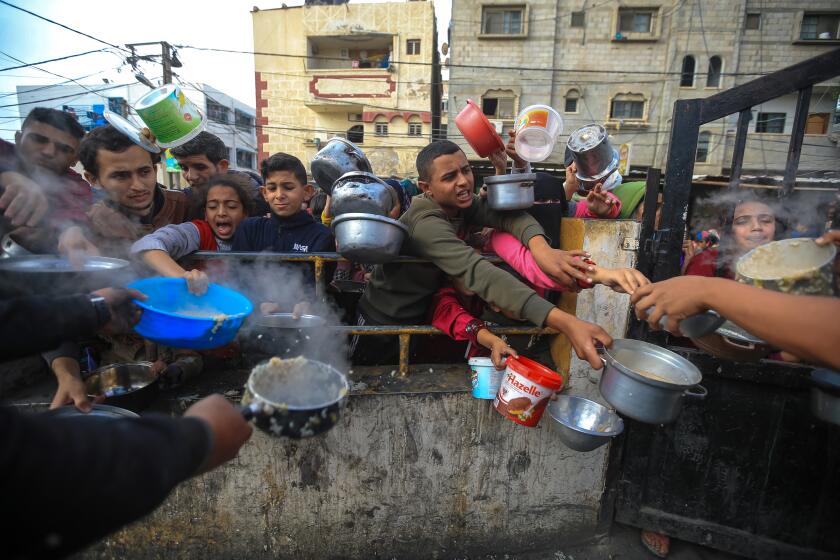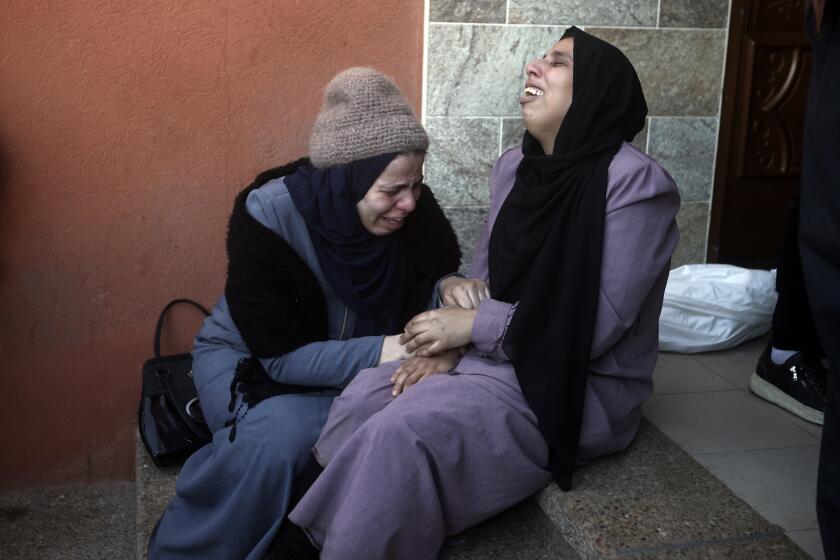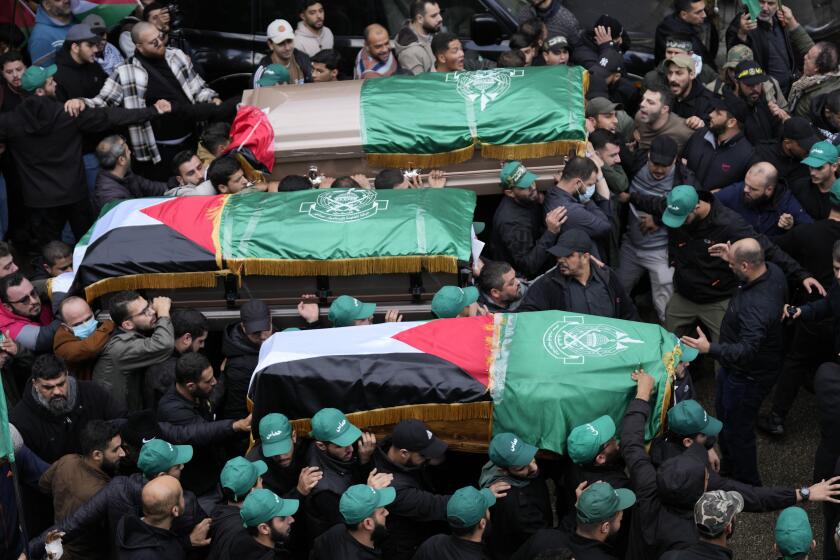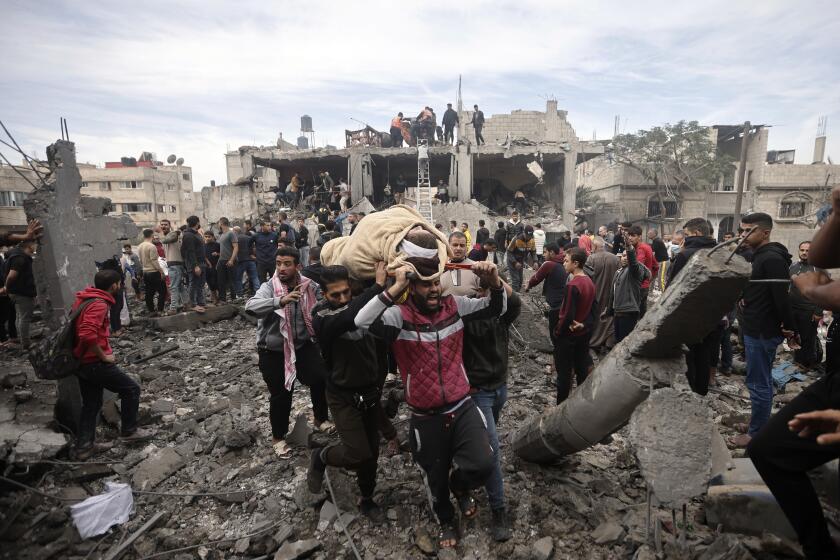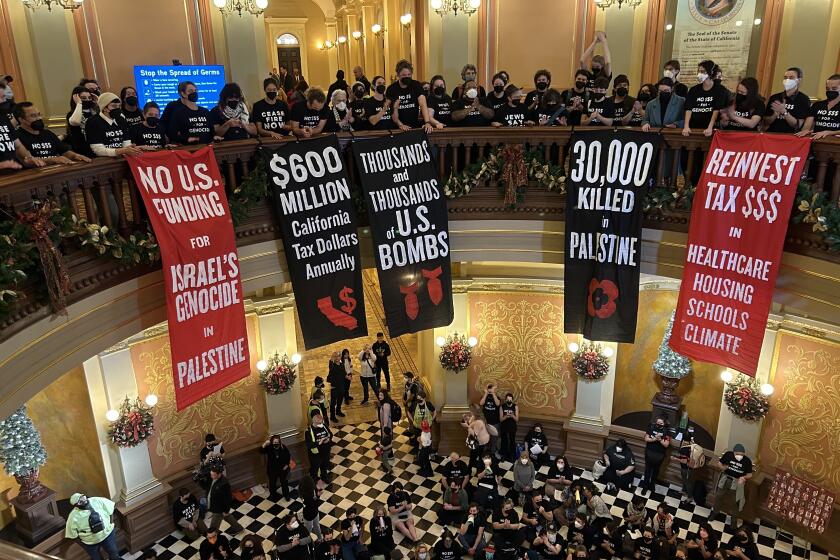‘Living like dogs,’ families in Gaza desperately search for food and water
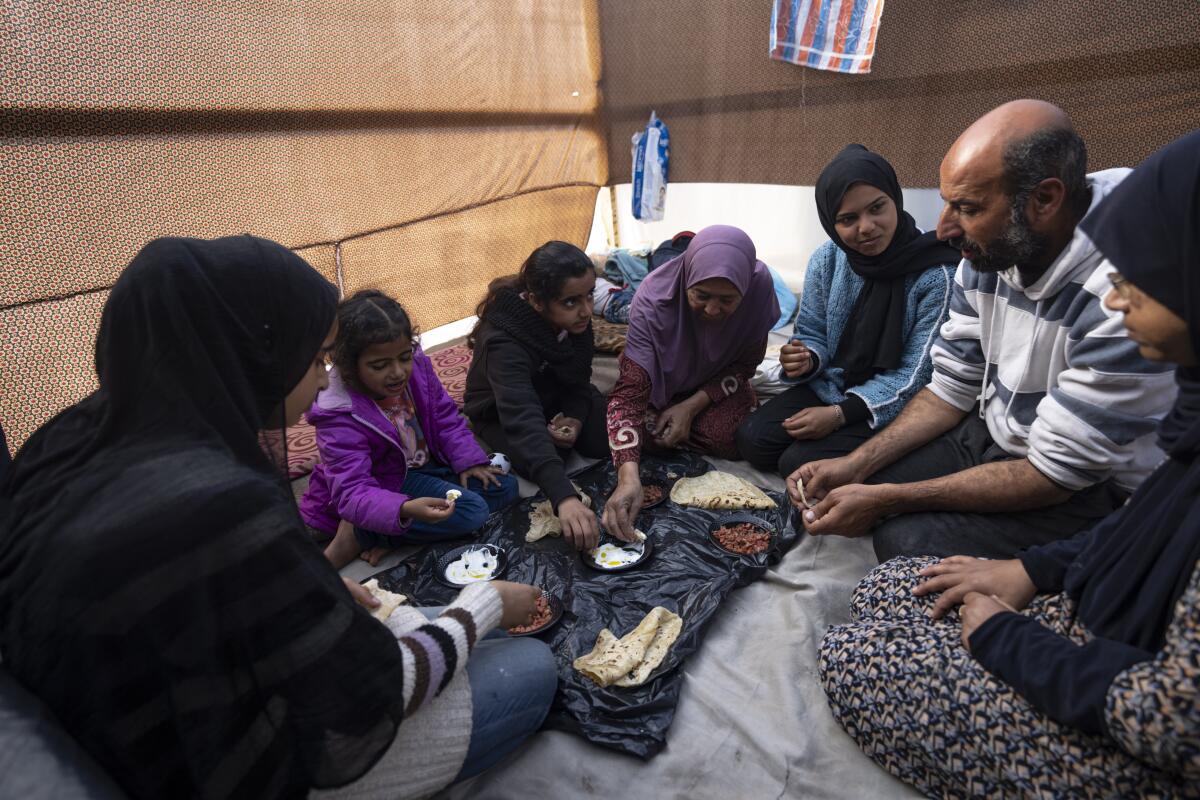
- Share via
MUWASI, Gaza Strip — Stranded in a corner of southern Gaza, members of the Abu Jarad family are clinging to a strict survival routine.
They fled their comfortable three-bedroom home in northern Gaza after the Israel-Hamas war broke out nearly three months ago. The 10-person family now squeezes into a 172-square-foot tent on a sandy, garbage-strewn plot, part of a sprawling encampment of displaced Palestinians.
Every family member is assigned daily tasks, such as collecting twigs to build a fire for cooking and scouring markets for vegetables. But their best efforts can’t mask their desperation.
At night, “dogs are hovering over the tents,” said Awatif Abu Jarad, an older member of the family. “We are living like dogs!”
Palestinians seeking refuge in southern Gaza say every day has become a struggle to find food, water, medicine and working bathrooms. All the while, they live in fear of Israeli airstrikes and the growing threat of illness.
Israel’s bombardment and ground invasion of Gaza, now in its 13th week, have pushed almost all Palestinians toward the southern city of Rafah along the Egyptian border. The area had a prewar population of around 280,000, a figure that has skyrocketed to more than 1 million in recent days, according to the United Nations agency for Palestinian refugees.
U.N. and other agencies sound alarm over ‘acute food insecurity’ in Gaza. One in 4 Palestinian households is facing extreme hunger.
Rafah’s apartment blocks are crammed with people, often extended families who have opened their doors to displaced relatives. West of the city, thousands of nylon tents have sprung up. Thousands more people are sleeping in the open, despite the cool and often rainy winter weather.
Most of northern Gaza is now under the control of the Israeli army, which early in the war urged Palestinians to evacuate to the south. As the war progressed, more evacuation orders were issued for areas in the south, forcing Palestinian civilians to crowd into ever smaller spaces, including Rafah and a nearby sliver of land called Muwasi. Even these supposedly safe spaces are often hit by airstrikes and shelling.
The war broke out Oct. 7 after Hamas militants stormed into southern Israel, killing about 1,200 people and abducting 240 others, the Israeli government says. The fighting has killed more than 22,400 Palestinians, according to the Health Ministry in the Hamas-run territory, which does not differentiate between civilians and combatants.
According to Nouman, Awatif’s brother, the conflict drove the family down the entire length of Gaza. They fled their home in the northern border town of Beit Hanoun on the first day of the war and stayed with a relative in the nearby town of Beit Lahia.
Palestinian hospital officials say an Israeli strike hit a home in a southern Gaza “safe zone,” killing at least 12 people, almost all of them children.
Six days later, the intensity of Israeli strikes in the border area sent them south to Al Quds Hospital in Gaza City. As people started to evacuate the hospital two days later, they traveled to the Nuseirat urban refugee camp in central Gaza, making the six-mile journey on foot.
They stayed in a cramped U.N. school building in Nuseirat for more than two months, but left Dec. 23 as the Israeli army turned its focus toward Hamas targets in central Gaza refugee camps.
They escaped to Muwasi on Dec. 23, believing it was the safest option. On the first night, they slept out in the open. Then they bought nylon and wood in a Rafah market to build a tent.
Nouman, an accountant, sleeps on the nylon-covered floor with his wife, sister, six daughters and one grandchild. They sleep on their sides to conserve space.
Thousands of people took to the streets of Beirut for the funeral of a senior Hamas leader who was killed in an apparent Israeli airstrike this week.
He said the tent cost 1,000 shekels, about $276. “It is completely crazy,” he said. In Rafah’s demand-driven war economy, larger pre-built family tents now range from $800 to $1,400.
The family’s daily hardships begin at 5 a.m. Nouman said his first job is to start a small fire to cook breakfast, while his wife and daughters knead dough for flatbread and then wash their utensils and metal cooking griddle.
After they eat, their attention turns to fetching water and food, tasks that take up most of the daylight hours.
Nouman said he and several of his younger relatives collect jugs of water from one of the public pipes nearby, water that is exclusively used for washing and not suitable for drinking. Next, they head to one of the dozens of drinking water tankers dotted across the city, where they wait in line for hours.
Start your day right
Sign up for Essential California for the L.A. Times biggest news, features and recommendations in your inbox six days a week.
You may occasionally receive promotional content from the Los Angeles Times.
A gallon of drinking water costs one shekel, or 28 cents. Some Gazans, desperate for cash, wait in line just to sell their space.
After the water is fetched, family members go from market to market to hunt for vegetables, flour and canned food for that evening’s meal. Meanwhile, Nouman busies himself with scouring the ground for twigs and bits of wood to make a fire.
Food prices have soared. Gaza is facing acute food and medicine shortages and is dependent largely on aid and supplies that trickle in through two crossings, one Egyptian and one Israeli, and what has been grown in the recent harvest. More than half a million people in Gaza — roughly a quarter of the population — are starving, the U.N. said in late December.
Dalia Abu Samhadana, a young mother sheltering with her uncle’s family in a crowded house of 20 in Rafah, says the only food staples at her local market are tomatoes, onions, eggplants, oranges and flour. All are virtually unaffordable.
Civilians are pawns in the war in Gaza, yet humanitarian assistance has been made conditional, withheld or delivered according to political and military agendas.
A 55-pound bag of flour cost around $10 before Oct. 7. Since then it has fluctuated between $40 and $100.
“My money has almost run out,” said Abu Samhadana, who is unsure of how she will be able to feed her daughter.
Displaced Palestinians in Rafah are entitled to free aid if they register with the U.N. agency for Palestinian refugees, which hands out flour, blankets and medical supplies at 14 spots across southern Gaza. They often spend hours in line waiting for the aid to be distributed.
Abu Samhadana, who is originally from the nearby southern town of Khan Yunis, said she has tried to register for free aid several times but has been turned away because of the lack of available supplies.
On the day California lawmakers returned to Sacramento for the new year, hundreds of protesters convened at the state Capitol on Wednesday and shut down the Assembly with calls for Israel to stop its war against Hamas.
The U.N. agency is overwhelmed and already providing support to 1.8 million people in Gaza, according to Juliette Touma, its communications director. She said she did not know if the agency had stopped registering new aid seekers.
With few options left, some hungry Palestinians in Rafah have resorted to grabbing packages from aid trucks as they pass by. The U.N. refugee agency confirmed that some supplies of aid had been snatched from moving trucks but did not provide any details.
Hamas police escorting aid trucks from border crossings to U.N. warehouses have been seen beating people, mostly teenagers, as they try to grab what they can. In some cases, they have fired shots into the air. In one incident, a 13-year-old boy was killed when Hamas police opened fire.
Meanwhile, health officials warn of the growing spread of disease, especially among children.
After delays, the U.N. Security Council adopts a watered-down resolution calling for immediately speeding up aid deliveries to civilians in Gaza.
The World Health Organization has reported tens of thousands of cases of upper respiratory infections, diarrhea, lice, scabies, chickenpox, skin rashes and meningitis in U.N. shelters.
The rapid spread of disease is mainly due to overcrowding and poor hygiene caused by a lack of toilets and water for washing.
The Abu Jarad family dug its own makeshift toilet attached to the tent to avoid communal bathrooms. Still, the family is vulnerable to disease.
“My granddaughter is 10 months old, and since the day we came to this place, she has been suffering from weight loss and diarrhea,” said Majeda, Nouman’s wife.
Going to the pharmacy offers little help. “We can’t find any [suitable] medicines available,” she said.
More to Read
Sign up for Essential California
The most important California stories and recommendations in your inbox every morning.
You may occasionally receive promotional content from the Los Angeles Times.
